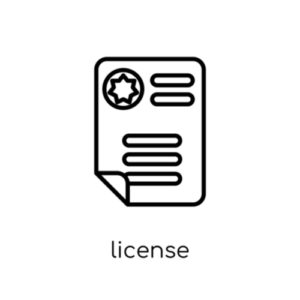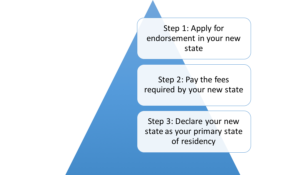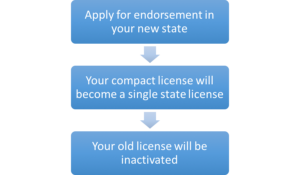 In the United States, registered nurses must comply with strict licensing regulations. These rules can be especially challenging to navigate for nurses moving across state lines. If you plan on moving to another state, you’re probably seeking the fastest way to transfer your nursing license so you can get back to work. In some cases, transferring your nursing license across state lines is a quick and simple process. However, depending on where you plan to move, the transfer process can sometimes be a bit more time-consuming.
In the United States, registered nurses must comply with strict licensing regulations. These rules can be especially challenging to navigate for nurses moving across state lines. If you plan on moving to another state, you’re probably seeking the fastest way to transfer your nursing license so you can get back to work. In some cases, transferring your nursing license across state lines is a quick and simple process. However, depending on where you plan to move, the transfer process can sometimes be a bit more time-consuming.
Become Familiar with National and State Nursing Requirements
Registered nurses working in the following locations are required by law to have a valid nursing license:
• The United States
• The District of Columbia
• The U.S. Territories
Additionally, all nurses are required by United States law to:
• Graduate from an approved nursing program (BSN, ADN, or diploma program)
• Pass the National Council Licensure Examination (NCLEX-RN)
Aside from these national requirements, there are certain state requirements you must comply with as well. As you begin the process of transferring your license, be sure to research all requirements in your new state. For example, many states require background checks. This can come as a surprise to a nurse moving from a state such as New York where background checks currently aren’t required.
For more info on state-specific nursing requirements, see the 2019 State-by-State Guide to RN Licensure.
The Nurse Licensure Compact Could Simplify Your Transfer Process
If you’re in the process of moving, you should first determine if your new home is a compact state. If you’re moving to a compact state, the Nurse Licensure Compact (NLC) will allow you to practice in your new state without re-taking the NCLEX exam or obtaining a new certification. Currently, thirty states participate in the NLC, and eight others are in the process of becoming compact states.
The requirements for obtaining a compact license are as follows:
• You must be a legal resident of a compact state
• You must hold an active RN license, and your license must be in good standing
• You must meet all current license requirements in your home state
For a full list of compact states, see the NCSBN website.
Transferring Your License to a Non-Compact State
Unfortunately, if you’re moving to a non-compact state, transferring your license can be somewhat more difficult. Some states, such as California and Massachusetts, have chosen not to participate in the Nurse Licensure Compact. Many non-compact states are concerned about adequate training and quality of care, so they choose to set their own nursing standards.
If you’re in the process of moving to a non-compact state, you’ll need to research your new state’s additional requirements. You’ll need to apply for endorsement in your new state, and this process can sometimes take months from start to finish. Therefore, it’s best to get the process started before you plan to live in the new state full-time.
Non-compact states will have detailed information about their nursing license requirements on their websites. For a better idea to what to expect when transferring your license to a non-compact state, you should reference your new state’s website.
A list of non-compact states can be found on the NCSBN website as well.
How to Proceed if You Currently Live in a Compact State
Your next steps will depend on your current location, as well as the state you’re relocating to. Follow this easy guide to determine how to proceed with transferring your nursing license.
Transferring Your License from a Compact to Compact State:
If you currently hold a compact nursing license and are moving to another compact state, you must:
• Apply for endorsement before you move (preferably 2 months in advance)
• Pay the required fees
• Declare your new state as your primary state of residency
Once you’ve moved to the new state, you’ll be able to practice on your old license for between 30 and 90 days, depending on state rules. Then, you must obtain a new compact license that reflects your current state of residency. After this, your old one will be inactivated.
Transferring Your License from a Compact to Non-Compact State:
If you currently hold a compact nursing license and are moving to a non-compact state, you must:
• Apply for endorsement before you move (preferably 2 months in advance)
• After your endorsement goes through, your compact license will become a single-state license valid only in your home state.
• Then, after your new license is active, you must notify the board of nursing in your former state so your old license can be inactivated.
How to Proceed if You Currently Live in a Non-Compact State
If you currently live in a non-compact state, the next steps you take will depend on the state you’re moving to. Read on to learn how to transfer your nursing license as quickly as possible.
Transferring Your License from a Non-Compact to Compact State:
If you currently hold a non-compact nursing license and are moving to a compact state, all you have to do is apply for endorsement in your new state before you move. You’ll be able to hold both a compact license in your new state, as well as a non-compact license that allows you to practice in the original state in which it was issued. Your old license will still remain active for as long as you continue to maintain it.
Transferring Your License from a Non-Compact to Non-Compact State:
If you’re moving between non-compact states, all you need to do to apply for a new license is contact the state board of nursing. However, you should keep in mind that your new state’s requirements could differ from your old state’s. For example, your new state could require you to get your fingerprints taken even if your old one didn’t. Be sure to research all requirements in advance so you’re prepared to obtain your new license quickly.
Start the Process as Early as Possible
Regardless of whether you’re moving to a non-compact or compact state, one piece of advice holds true: It’s best to start the transfer process as early as possible. In an ideal situation, you should have months to spare when you apply for endorsement in your new state. This will ensure that you’ll have plenty of time to fill out all all necessary paperwork and wait for your endorsement to go through. With the help of this guide, you should be able to research your new state and compile all the resources you need for a smooth transition.
Erica Ciko Campbell
Bachelor of Science (B.S.), Biology| Utica College
Associate of Science (A.S.)| Herkimer County Community College
October 2019
More Articles of Interest:
- Do I Need to Have a Medical Degree to be Involved in Clinical Research?
- What is Clinical Research?
- What Kind of Background Does FEMA Look for in Employees?


